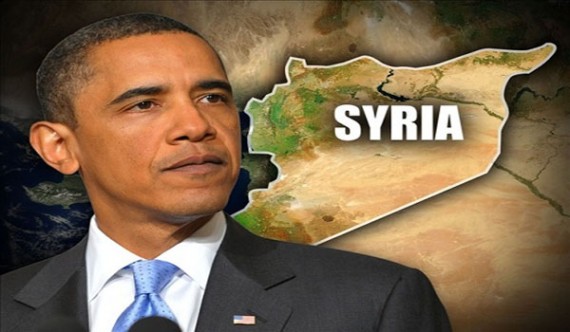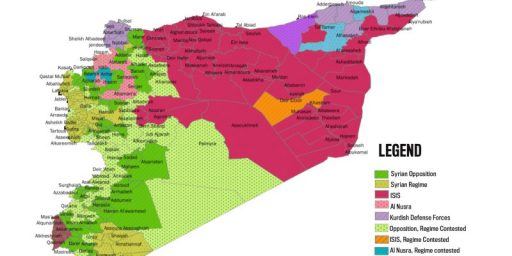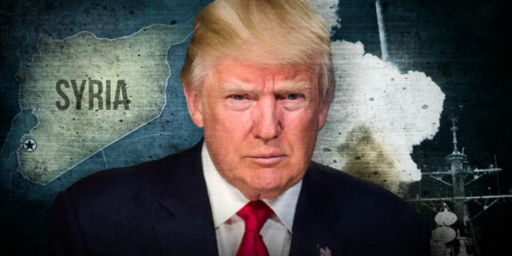Pentagon Says Obama’s War Against ISIS Likely To Last Years
The war against ISIS continues to silently escalate, with little input from the people's representatives in Congress.
In its first briefing in the wake of last night’s bombing attacks on Syria, Pentagon officials said that this was just the beginning of a conflict likely to last years:
The first airstrikes launched against the Islamic State of Iraq and the Levant in Syria by the U.S. and a handful of Arab allies were “very successful,” the Pentagon said Tuesday, but warned they were just the start of a long campaign that could go on for years.
“Last night’s strikes are the beginning of a credible and sustainable, persistent campaign to degrade and ultimately destroy ISIL,” Lt. Gen. William Mayville, director of operations for the Joint Staff, told reporters at the Pentagon.
“I think it would be in terms of years, yes,” Mayville said when asked about the length of the campaign.
The Defense Department offered its initial assessment of the new military strikes in which the U.S. and five Arab countries — Saudi Arabia, Jordan, Qatar, Bahrain and the United Arab Emirates — worked together to attack ISIL targets in Syria. The U.S. also unilaterally struck an Al Qaeda affiliate that the Pentagon said posed an imminent threat to the West.
“Our initial indication is that these strikes were very successful,” said Pentagon press secretary Rear Adm. John Kirby, emphasizing as well that Monday’s airstrikes involving a mix of Tomahawk missiles, drones, fighters and bombers were “only the beginning.”
This admission from the Pentagon that the conflict against ISIS could take a long period of time isn’t really new, of course. Early this month, even before the President had announced the new shift in policy toward attacks in Syria, aid to the “moderate Syrian rebels, and the plan to “degrade and destroy” ISIS, Administration officials were saying that it may take years for the President’s plan to work. Given the nature of the President’s plan, this seems to be a realistic, perhaps even conservative estimate of our abilities in this conflict and the fact that, even by the most conservative estimates, it would take roughly a year to both train and reorganize an Iraqi Army that has been demoralized by repeated defeats at the hands of ISIS and to arm and train the “moderate” Syrian rebels. Air strikes can obviously do real damage assuming that we know where to direct our targeting, which of course requires some kind of force on the ground to make those determinations, but it’s going to require a ground force of some kind to dislodge ISIS from its strongholds. Since the President has ruled out the use of American ground troops, even though both the Chairman of the Joint Chiefs and the Army Chief of Staff have said that they might be necessary, these are the forces that we have to rely upon, and leaving aside the fact that neither one of them is very reliable to begin with, it’s going to take some time to get them to the point where they can actually fight the way that we need. Add into the equation an international coalition that seems more interested in sitting back and letting us handle most of the dirty work than actually getting their hands dirty, and you’ve got all the ingredients for a prolonged, sustained conflict with an uncertain future that could very easily escalate far beyond our control.
Of course, as Daniel Larison points out, when this whole thing started months ago, we were being told a slightly different story:
When airstrikes began in Iraq six weeks ago, the administration initially said that a “sustained campaign” is exactly what the U.S. was not starting. That seemed hard to believe at the time, and that’s because it was plainly untrue. Interventionists always understate the costs and duration of the military action they’re proposing at the beginning to reduce resistance, and only once the action has begun do they start to acknowledge that the original claims weren’t true. In the weeks that followed, the president and other U.S. officials have gradually conceded that the expanding mission could take several years, but it’s important to remember that this policy was originally sold as a brief, limited, and defensive use of force. Now it will be-by the administration’s own admission-prolonged, open-ended, and offensive in nature.
Every step along the way, the administration has set down restrictions on what it would be willing to do, and it then cast those restrictions aside within days or weeks of imposing them. The administration is currently saying that there won’t be American forces on the ground engaged in combat, but as we should know by now every statement like this is entirely provisional and can be revoked at any time.
In the space of just about two months, the Administration has escalated from a limited conflict with the mission of protecting the Yazadi and American diplomats stationed in and around Kirkuk, to a broader conflict designed to aid the ground forces of the Kurds and the Iraqi Army in their fight to regain territory such as the Mosul Dam from ISIS control, to what we have today, the President’s plan to “degrade and destroy” ISIS which relies upon forces over which we have, at best, indirect control. In the meantime, we have two of the top military leaders in the country telling us that the plan we’re following now may not be sufficient to achieve the goals that the President has set forth. Given the Administration’s history of escalation in this conflict, over such a short period of time, it’s difficult to believe that the President’s promise of no American ground troops is one that is going to last for very long. Whether it’s because of a military setback, the possibility that training the Iraqis and “moderate” Syrians will take longer than projected, or because the plan just doesn’t work, how long will it be before the President is back before the country announcing that he finds himself forced to send American combat forces to fight ISIS. Since we have already committed ourselves to the fight in some sense, it will be next to impossible for him to back out at that point. That’s the problem with escalating a conflict without having a coherent plan.
The probability that this conflict to drag on for years, combined with the escalation that we’ve seen just in the last two months, is of course yet another reason why this conflict needs to be debated and voted upon by Congress. The Constitution and the War Powers Act would seem to require no less, after all. Instead of doing that, however, our representatives on both sides of the aisle have evacuated Washington, D.C. to go run for re-election and won’t be back until the Lame Duck Session in December, when it may well be too late for Congress to have a meaningful debate about a conflict that by then will have been going on for nearly five months. Moreover, the idea of a Congress that will include people who have been voted out of office voting on something like this after the election is, to say the least, pretty appalling, but of course it’s just the end result of the fact that most of the people on Capitol Hill did not want to be forced to weigh in on this issue before facing the voters in November. That’s nothing less than cowardly, but that’s basically what we get from Washington these days.







Yes, Doug, it’s going to take a while to cope with the collapse of the Arab world and the turn to terrorism. Maybe we could all grow up and recognize that we have a chronic condition not easily resolved by nuking Hiroshima and holding a victory parade.
recognize that we have a chronic condition not easily resolved
Yes, bombing Muslims is an effective way to moderate their extreme views. HA!
Not sure which is more ridiculous, your partisan hackery or your tired repetition of same losing arguments.
@edmondo:
And you plan is?
@michael reynolds:
And diplomacy…the most important element…and one that Kerry seems to be making headway with.
Bombs are sexy….and easy.
Diplomacy is the real work…the hard work.
Seriously…Iran is involved…and now Turkey? That is swinging the “big dick” if you ask me.
Just watched a talking head (John Nagl, LTC (ret)) say that we’ll need to stay in Iraq for the next 50 years. Also that we should’ve left 25,000 advisors in 2011. It never ends.
On the lighter side, here is a little humor on the subject:
http://www.duffelblog.com/2014/09/pentagon-advisers-iraq-syria/
As far as I can see, Doug’s view is that ISIS poses no threat to American interests and therefore we should stand aside from the turmoil in Iraq and Syria and let events in that part of the world take their course. Am I right, Doug? And if I’m not, what do you think President Obama should do in this situation?
@michael reynolds:
Serious question, what’s your plan for after this? For the next one? And the next one? And the next?
When does it end, Mike?
@Jeremy:
It never ends. Ever.
To Jeremy, Grewgills, and others — you seem to agree with Doug that ISIS poses no threat to American interests and that we should refrain from intervening again in the Mideast except to provide humanitarian aid. Is that your recommendation? The world wonders.
@Jeremy:
The facile answer is that it goes on as long as it needs to, but I sense that you’re looking for something more. So let me take a stab at it since Doug admits he has no clue and the president’s critics here are struck dumb by the question.
First, I think the problem we have is in effect a clash of civilizations, but in rather less dramatic terms than what people think of when they hear that phrase. We can threaten the very existence of the Arab Middle East, they have no similar capacity to threaten us. So this is big vs. little, strong vs. weak, and what we have here is essentially an irritation, a chronic condition. We have to manage the irritation lest it grow serious. Like a basal cell carcinoma – possibly disfiguring if you don’t treat it, but not fatal.
You can say this is a collapsing civilization, or you can argue that it’s just the aftershocks of the collapse of the Ottoman Empire, doesn’t matter, either way we have a swathe of failed states across the MENA – and other states that are fragile and could fall in a stiff breeze. That latter group are our nominal friends – the KSA, the UAE, Jordan.
Our game is to keep oil flowing and terrorism limited as the Arab world slowly comes to grips with the fact that it is intellectually, morally, philosophically and politically bankrupt. Will they figure that out? Maybe, maybe not, but either way we want oil to flow and terrorism not to become disfiguring.
The best example would be the Cold War. We always said that Communism would fail due to the inherent inefficiencies in their system. It took roughly 70 years for that to happen. From 1945 onward we set our sights on stopping their expansion, and limiting the damage they could cause while we waited for them to fall over dead. The entire time people asked ‘how long?’ And of course we didn’t know. Turned out the answer was, 1989. It was expensive and dangerous as hell, but it was what it was and now it’s over.
In the MENA we have a reaction against the modern. Tribal societies, rigid religious ideologies, an absence of institutions outside of the religious establishment and the army leaves these people and countries incapable of adjusting to the modern world. (Similar in terms of the underlying emotions to the Tea Party in this country.) They are sidelined, they are a backwater, and they lack the tools to adjust or to catch up. So they turn to what they have – religion – and given the history of the area that quickly turns extreme and then violent.
What we need to do with ISIL is what we need to do with the area generally: contain, isolate, deprive them of money and support, strengthen the more friendly nations in the region, and wait. We keep them in a box while they either mature and become rational members of the world, or turn into Somalia writ large. Either way we keep them in a box, quarantined, like disease carriers. At the human level it is horribly tragic, one can only feel sorry for women especially, but for anyone with any aspiration to a better life. But as a cold calculation of our interests, it’s pretty
straightforward.
Everyone needs to calm down. This is not the Nazis this is more on the level of Barbary Coast piracy or 19th century Spanish imperialism – a pain in the ass, more expensive than we’d like, and it will take longer than we would like.
One more thing. If you want something to worry about, worry about Pakistan. We could have a nuclear-armed failed state there. That’s real bad. Much worse than this.
A div HQ Glad there are no troops on the ground. Do they think we are idiots?
I agree with Michael Reynolds’ analysis. And I’ll again say, primarily to Doug, it would be more candid of you to acknowledge the logic of your remarks. You think the US should refrain from further military interventions in the Mideast, presumably because you feel that ISIS poses no serious threat to American interests. This is a perfectly defensible position. Why not say it, if that’s what you believe?
I seem to recall that michael and many other liberals were not so understanding with Bush’s war on terror.
@The other Jack:
You recall no such thing regarding me.
@The other Jack:
Which part of it? The perfectly correct and necessary retaliation against the Taliban after 9/11, or the insane invasion of Iraq that has now borne such putrid fruit? I seem to recall it was the Republicans who couldn’t tell them apart, not the liberals.
@Stan:
Not sure how you abstracted my comment into that, but no.
I think the best we can do is containment with air and intelligence support for our friends (such as they are) on the ground. I wish Obama were less vigorous in his military response there, but as long as he keeps it to the air with very limited special forces involvement I won’t be too upset. If he ramps up for Iraq 3.0 then I will be showing up at my senator’s door complaining.
I am happy with how much success Kerry has had so far in bringing in more Gulf states, but without them putting ground forces in play and without them cracking down on their own citizens that are funding these barbarians then this will last a very long time. I don’t count on them doing either so we’re in it until we get tired of it, because until then if it’s not ISIL it will be someone.
… and water is wet.
@michael reynolds: I basically agree, but with some diplomacy and investment in the region, we can probably cut it from 70 years to 20. A lot of people end up supporting the fundamentalist crazies because they are the only ones to effectively oppose the corrupt secular dictators who are keeping so many people poor.
We need to support better corrupt secular dictators — ones that give the people under their rule more economic opportunities.
And bomb the fundamentalist crazies to keep them from organizing.
And maybe do some large scale investment in infrastructure in the region.
I wonder how long an extension of the patriot act will be “required” to deal with this and what new powers will be demanded in the name of national security. Amazingly, a mortal threat emerges in time to justify the surveillance state yet again; even more amazingly the media drumbeat now has a large majority of Americans, with their famously short memories, demanding war against a group they hadn’t heard of a few months ago, even though after thirteen years of the same we haven’t destroyed a single enemy.
The Taliban are still there, al-Quaeda still exists; now we add a new group of bad guys we’ll never beat, as evidenced by a plan for war with no defined end-point. War against a group openly demanding we attack it.
@Grewgills: I misunderstood your remark, and I agree with your views on the use of ground troops.
This could be a very astute move for the Democratic Party for 2016. Limited involvement or containment or some form of Michael Reynolds’ plan leaves the Republicans with either advocating ‘boots on the ground’ or complete pull-out. Neither of which will be very popular with voters, and both will give the Democrats plenty of material for campaigning.
@Eric Florack:
And then he signed the Status of a Forces agreement in 08 that said we’d be gone by ’11.
Lying doesn’t make something so.
There are, I think, three ways that the ME can deflect most Americans from the lives we wish to live. The most obvious is the export of petroleum from the Persian Gulf. The second and almost as obvious involves Israel. Threats to them always pull us into the ME — and they are the ones who get to determine what a ‘threat to Israel’ is, an obvious imbalance. The third is the ‘homeland security’ apparatus that troubles us in small ways (TSA inspecting my frigging shoes) and large (Google coordinating with NSA inspections of my and your e-mail accounts).
There is a forth: We have to listen to total nincompoops like Bill O’Reilly (“A MERCENARY ARMY”) and Sen Graham (“THEY’RE COMING TO KILL US IN OUR BEDS”).
The one that bothers me most is #4. It makes #3 much worse for the whole concept of liberty and representative democracy.
@The other Jack:
This is utter BS, Most people like me were for the containment of Iraq and Afghanistan rather then a full scale invasion. Especially in Iraq where a bottled up Saddam Hussein would have been to our advantage. any time i mention this to war supported I was told that it would be impossible to sustain containment (no fly zones, advisers to local allies ect.) due to the “expense and open ended nature of the scheme.
My argument then was exactly what Michael is talking about, if you think we can’t afford containment over the long haul wait till you see the bill for a war. I was called every name in the book, stupid, libtard, didn’t know what I was talking about blah blah. Every single one of those people were expecting a quick war, defeating the enemy then calling it quits and going home. not only was that wrong but it cause so many of the issues were are dealing with right now even to the point were containment policies are made more difficult and expensive. yet Obama is being blamed and the hawks have no ideas at all other then more war (and lower taxes).
I keep thinking that sooner or later somebody will notice that you can not defeat an ideology with bombs and bullets. I know, I know… my optimism borders on naivete.
It seems what Larison and Doug are complaining about is that the President was being realistic. Should he have promised unicorns, lollilops and everyone home for Christmas? I would be denouncing that as nonsense had he done so. We have seen far too much of that from US Presidents since at least the Civil War.
Any strategy aimed at checking and containing ISIS (A descriprion I prefer to “degrade and destroy”) has to be cast in terms of years, not days and weeks. Note that is the PENTAGON (that is, the military experts) who say years.
Now should Congress weigh in on this? Yes, I agree.
But Congress would rather do like the pundits-sit on the sidelines and offer criticisms with no meaningful alternatives. (Note that General Larison-like General Mataconis-offered no alternate plan).
DrDaveT:
Exactly, and this is a good moment to recall that Bush’s approval ratings at that time were over 90%, the highest numbers for any president, ever. So support for that retaliation was virtually unanimous. Bush’s next move was to lie us into war with a country that had nothing to do with 9/11, and that’s a quite separate matter.
@Stan:
He is not doing so because he most likely knows he can’t defend his position. Every time he gets into his car and drives anywhere he is reminded that the USA indeed does have vital interests in the Middle East area. His car is just a big hunk of metal without gasoline.
What’s interesting is that there is really just one way that the USA can wean itself way from Mideast involvement-a long term strategy to move the US economy away from dependence on oil. But Doug as a libertarian would oppose that as interference with the holy free market and oil company “property rights”.
@OzarkHillbilly:
Of course you can defeat an ideology with bombs and bullets: the Japanese militarists, Italian fascists, nazis, Albigensians, British imperialism, southern secessionists, off the top of my head. War works. That’s why people do it.
@michael reynolds:
and a very good stab as it turned out.
An excellent essay–spot-on analysis of the dilemma we face. Boehner’s refusal to call the House into session to debate our entry into what may be a Thirty Years War is simply shameful.
I expect the ‘no combat ground troops’ promise to melt away a week after the November elections. If I understand how airstrikes are conducted, there have to be some people on the ground to help select targets, and assess damage after. Ergo, we already have quite a few boots on the ground. What we don’t have, yet, are companies of infantry riding helicopters and tanks into direct engagements, which is what most people think of when they hear the term ‘boots on the ground’. It takes a while to stage that sort of thing, given the fact that those infantry need logistical and medical support in order to operate.
Wait for it, it’s coming…
@michael reynolds:
Oh, Michael, Michael, Michael. You think the Albigensians are gone? WE’RE EVERYWHERE, MAN!!!! THE ALBIGENSIAN TRUTH WILL NEVER DIE!!!
@The other Jack:
1. War on Terror != War in Iraq
2. Tactical and moral disagreement (don’t torture! don’t throw people into indefinite denention) != opposition to the core policy.
@michael reynolds: That would require waging war the way it was meant (which happens to be politically incorrect today) by killing most of the military aged males, appointing a military governor for 30 years and building up institutions you can ease trusted citizens into. Total War. Having your occupying force marry and start families with local women is a big plus as well. Its a tried and true process to culture change and societal redirection. Since the US doesn’t and wont do that– Air strike and occupations are a waste of time and money.
One thing we can be sure of. It will last until the public tires of the bill….and then a new Boogie man will be created. American History for the last 80 years has been one Boogie Man after the other, each intent on world domination and destroying the American way of life. Oddly non of them ever even attempt to do so.
The news media is a willing participant in these marketing campaigns. This new boogie man can’t even win in Syria or Iraq…now they are “like nothing we’ve ever seen?!?!?!” When is the American public going to throw the B.S. flag? All it takes is few videos and scary looking guys in ninja suits killing a few people and the country beats a path to charge a few more Trillion onto the national debt to eliminate the “threat”. If it wasn’t sad—it’d be quite funny.
@Pharoah Narim:
We buried communism without ever putting a single soldier in the USSR.
Here is a detailed discussion on the politics of why Congress hasn’t taken a vote on this “war”:
Expect no action by Congress on this, absent some catastrophe.
You go to war with the congress you have, not the congress you want.
War on ISIS makes as much sense as the War on Iraq (2nd edition), and the outcome will be roughly the same.
The most interesting part is how many have changed opinions about the necessity of going to war in Middle East simply because the team in power has changed – and I note there are many people on all sides who have been consistent, its just the ones who’ve flip flopped that I find intriguing.
@micheal
I seem to recall the use of words like quagmre and whack a mole quite a great deal back then
@dr
One can always nick pick and make excuses saying it different because some lame thing like one wore a red tie instead of blue or whatever However it doesn’t change the fact that both said it will last a long time and a person supporting one while bashing the other for saying the same thing
@The other Jack: @george:
An air campaign with allies in country acting as ground troops to contain and diminish a terrorist group with the acting government’s consent is not the same as a full scale invasion to depose and replace a nation’s government. There are valid reasons to oppose both, but they are far from the same thing.
I opposed the first vigorously for fear that Iraq would become a Shia theocracy. I wouldn’t call that an entirely accurate prediction, but it comes a lot closer than what was advertised. I think we are investing too much for too little return here, but it is no where near the same level of commitment and the downside is considerably smaller.
george:
What’s “intriguing” is how you show proof of this many “who’ve flip flopped:” zero.
The other Jack:
Hilarious. I wonder if you recall who was among the first to use that word. Link.
Yet another persistent right-wing myth. Link.
Apropos the most recent comments:
Obama’s Iraq is not Bush’s Iraq